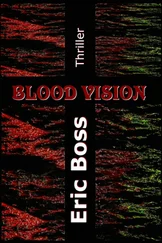“I’d like to speak to Jack.”
“Would you now?” Jenkins had a way of saying no without actually saying the word. “It is your uncle’s opinion that you have formed a … how shall I put it?… an unnatural attachment to Jack McClure.”
She stared at him, wide-eyed. “And you believe that?”
“It doesn’t matter what I believe. I work for your uncle.”
She stared out the one window at the snaking gravel driveway. All of a sudden, she took up a poker from the fireplace and slammed it against the window. It bounced off, as if the pane was made of rubber. Alli swung again and again, grunting with each swing, without even a single crack to show for her effort.
She whirled on Jenkins just as the door burst open and a man with the massive sloping shoulders and raw, red face of a weightlifter rushed in.
Jenkins raised a placating hand. “It’s all right, Rudy. No harm done.”
As if to prove his words, he crossed to where Alli stood and took the poker from her. Rudy relieved him of it, and, with a last look at Alli, went out of the study, closing the door behind him.
“The windows are both bulletproof and alarmed,” Jenkins said.
Alli turned to the attorney. “I used to come here when I was a kid. I broke that window once. When did that happen?”
“Five years ago,” Jenkins said. “Maybe six.”
“So I’m a prisoner in my uncle’s house.”
“I’m afraid so.”
His words hung in the room for some time. A phone rang distantly and then stopped. A dog began to bark somewhere outside, its excitement rising.
“You’re both mental as anything.” Her voice was thin and ragged with despair. She felt herself crawl back into the shell she had created for herself when she had been kidnapped.
Jenkins appeared to be aware of this, because he said in his most soothing voice, “The most absurd aspect of the accusation is, of course, the torture. Scientific study tells us that the female of the species, though she can be as cold-blooded and capable of murder as a male, rarely has the stomach for torture. On the other hand, it is the torture of William Warren, so disturbing by its very nature, that is dictating this rush to judgment, at least in my estimation. It’s also the largest question mark. What did his killer or killers want from him? What information did he possess that they needed to go to such extreme lengths to get from him?”
He regarded her steadily. Clearly, he was looking for an answer from her. She shook her head. “I can’t say. I really didn’t know him that well.”
“Come on, Alli, you two were carrying on a love affair for five months.”
“That’s just it,” Alli said, “it wasn’t a love affair.”
“No, what was it then?”
“I was…” Her eyes darted away for a moment. “I was trying to regain a sense of myself, to, I don’t know, feel my body again, to be in control of it again.”
Jenkins sat studying her for a while, or perhaps he was pondering her words. At last, he said, “Did you care about Mr. Warren?”
“Of course I did.” She hesitated, but it was clear she had more to say. “But not … just not in the way you think.”
“What do you think I meant?”
“We weren’t lovers in the classical sense—like Romeo and Juliet.”
“If memory serves, Romeo dies.”
She snorted in derision.
“About the psychopharmacologist,” Jenkins went on. “One of the things he said about you in his report is that, in his opinion, you’re lacking in affect.”
“I think he ’s lacking in affect.”
Jenkins gave her a tight smile. “What his diagnosis means is that, basically, you have difficulty locating your emotions. Sometimes you can’t find them at all. In other words, there are times when you just don’t care about anything … or anyone.”
She looked away again.
“His evaluation will hold a great deal of weight in the course of the investigation. Typically, people who can’t feel—”
“I told you,” she flared. “No fucking drugs!”
“You’re not listening to me,” he continued doggedly. “Your reaction to your boyfriend’s death—or rather your lack of one—was duly noted by everyone at the crime scene, including those sympathetic to you.”
“You can’t possibly understand.”
He spread his hands. “Now is your chance to enlighten me.”
She stared at him, stone-faced.
Jenkins sighed heavily. “In return for you being held in your uncle’s recognizance instead of in a federal holding cell, the judge ordered a psychiatric evaluation.” He took another breath and let it out slowly, as if anticipating the coming storm. “You must comply with the psychopharmacologist’s diagnosis, which, of course, includes your taking whatever psychotropic medications he prescribes.”
Alli leapt up again and retreated behind the chair back, as if he were a lion from which she needed saving. “I can’t! I fucking won’t!”
“I’m sorry.” Jenkins regarded her with what seemed to be genuine pity. “I’m afraid you have no choice.”
* * *
DAYLIGHT SEEPED into the grove of trees with the blue-white flicker of a television screen. Jack, exhausted and frightened for Alli, had been scrutinizing the crime scene for hours. The detectives had made their reluctant exit, but Naomi Wilde and Peter McKinsey remained, along with Fearington’s commander, Brice Fellows, who had had sandwiches and thermoses of strong black coffee brought out from the academy’s commissary. Fellows, to his credit, stood back, sipping coffee, silently observing him as he worked. Jack was unfamiliar with McKinsey, but he had gotten to know Naomi well enough when she was guarding the FLOTUS. Carson had plucked Naomi out of her daily assignments specifically to guard his wife. That was how Edward Carson did things—by instinct. In thinking of Lyn Carson, Jack realized that no one had informed Alli that her mother was dead. On reflection, Jack supposed such news was better left undelivered for the time being.
Jack had spent his time wisely. As soon as there was sufficient natural light he switched off the spots and got to work. He had learned to distrust spotlights, which tended to distort perspective and played havoc with the impressions received by his brain. Circling the body in ever closing circles, his dyslexic brain literally took pictures of the corpse—not only the ashen color and unnatural granular quality of the skin, the grotesque disfigurement of body and face, but aspects other people could not see or perhaps accurately interpret. His brain, however, worked more than three hundred times faster than other people’s, and so it could recognize tiny anomalies and dislocations, and, in the time it took a human being to inhale and exhale, analyze them.
This was how he discovered the fracture below the left eye. It was precise, like a break a surgeon would make in the process of resetting a bone. There was, also, a deliberateness about it that intrigued him. He said nothing of either his find or his musings to the people in the grove with him.
He stood up and said to Fellows, “Commander, do you really believe Alli capable of this crime?”
Fellows’s meaty shoulders lifted and fell. “To be honest, Mr. McClure, I found myself a failure at human psychology the moment my wife of twenty years walked out on me without a word of explanation.”
He turned. “Naomi?”
She shook her head. “I can’t imagine it.” Her brow furrowed. “On the other hand, she’s like a closed book to everyone except you, so I’d ask you the same question: Is she capable of this kind of protracted violence?”
“Absolutely not,” Jack said.
“But we have the vial with traces of roofies under her bed,” McKinsey pointed out, “and a bloody knife in the trash behind her dorm.”
Читать дальше












